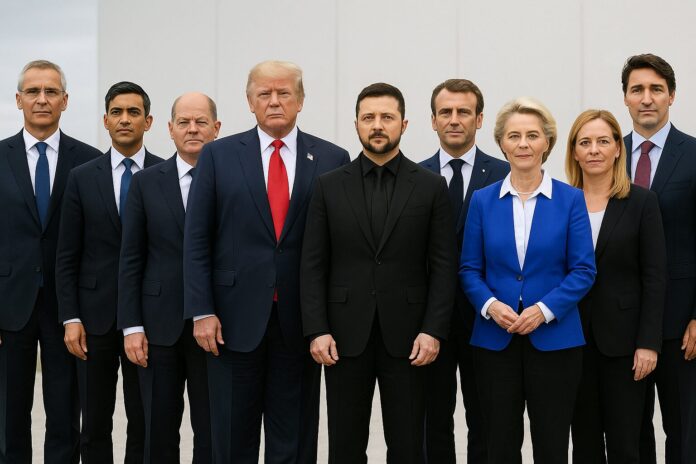The war in Ukraine has provided, if nothing else, yet another opportunity for Western “leaders” to huddle together for group photographs that advertise solidarity of… what, exactly? Certainly not resolve, not if resolve means bringing the war to an end rather than simply prolonging it. Oh, if only photo ops won wars! If only we could somehow prevail through posturing! If only our adversaries would be subdued by our summits, each long on ritualistic denunciations of Vladimir Putin, each providing a platform for statesmen take their turn at the podium, and each equally long on sonorous declarations that “we must stand up to him.” But they are chronically short on any result-oriented plan that might actually produce victory. The effect is to perpetuate the status quo, which, in wars, is only another name for eventual defeat.
Yes, President Trump deserves credit for seeking peace in Ukraine. Blessed are the peacemakers, for they will be called the children of God. Well enough. But that implies that peace is actually made, and on terms favorable to the righteous, and I fear that the conceit that this war can be tidied up with a deal, a handshake, or some “grand bargain” is a delusion, and a particularly Western one at that.
The central contradiction of the conflict is obvious to anyone not paid to ignore it: the West declares that it wants Ukraine to win, but then forbids Ukraine from fighting the kind of war that could possibly bring victory. It is the stated policy of the policymakers that Ukraine may not escalate the war, but victory requires escalation. So Ukraine is allowed to hold the line, to dig trenches, to ration its artillery shells, but not to do much in the way of attacking. Long-range strikes on Russian soil are vetoed, offensive capabilities withheld, escalation blocked at every turn. Ukraine is encouraged to win, but only on defense. Yet wars are not won on defense. One may delay defeat indefinitely, but victory requires the offensive, the act of breaking the enemy rather than waiting for him to exhaust himself. By imposing these limits, the West has engineered the very stalemate it now pretends to lament.
Europe, meanwhile, congratulates itself for sending (really, lending) money while declining to send what actually matters: its own armies. The Europeans have made Ukraine their proxy, the expendable bulwark against a threat they themselves will not meet. If they were truly serious about ending the war, they would commit overwhelming force. Instead, they hope that writing checks, and then placing restrictions on how the money and material can be used, will substitute for courage.
This leaves us with the most laughable illusion of all: that Vladimir Putin, having staked his personal and political survival on conquest, will one day grow weary, sigh heavily, and return the territories he has seized. History supplies no such example. From Georgia to Crimea, his land grabs have been permanent and cumulative. He is not waiting for the right compromise, but for the right opportunity to push further. His version of “peace” is victory.
Ukraine, of course, asks for what it cannot have: binding security guarantees from the United States and NATO. But such guarantees would mean a war with Russia at Moscow’s discretion rather than our own. No Western government will accept that. And so Ukraine remains in the cruelest position of all: the subject of lofty promises that can never be kept (see, for example: NATO’s refusal to extend membership), from Western leaders who want the war to end, but not enough to do anything meaningful about it.
It follows, then, that this war will not end in a deal, nor in some elaborate compromise that restores borders and absolves egos. It will end only when one side is broken, either Russia by the use of overwhelming force, or by exhaustion from Ukraine and its allies. At present, neither eventuality is close, every peace plan is a mirage, every negotiation a theater of performance, and the stalemate the only reality on offer.












